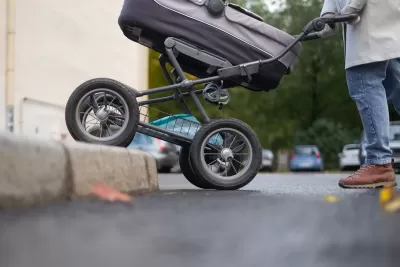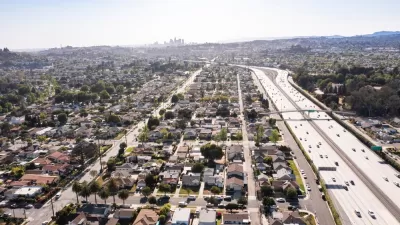The presence and quality of sidewalks, curb cuts, and other basic elements of infrastructure can speak to much more than just economic decisions.

In a piece published on Strong Towns, Tiffany Owens Reed lyrically describes another way of looking at cities and infrastructure: as symbols.
Consider, for example, the extremely wide lanes we have in many neighborhoods here in Waco. At first glance, this might just be a straightforward design issue: such wide lanes are extremely likely to induce speeding, making what should be a public space too dangerous for other people, especially children, and turning it into a domain for cars and their drivers. This straightforward analysis is important and valuable, but what happens if we think about it symbolically? Then the overly wide residential street becomes a symbol of our culture’s unexamined commitment to cars and a conversation starter about the cost of this commitment, specifically the way they are turning our neighborhoods into traffic corridors, not communities.
For Reed, infrastructure can communicate a community’s values and priorities. What does a lack of sidewalks say about who is welcome in a neighborhood? “Or consider the fact that there’s no coffee shop I can walk to and meet up with friends. Technically, this is a zoning issue; nothing more to it. But what do those zoning rules symbolize? What do they tell us about the patterns of life we believe belong in a neighborhood? What does they communicate about what we value?”
FULL STORY: The Symbols in the City

Maui's Vacation Rental Debate Turns Ugly
Verbal attacks, misinformation campaigns and fistfights plague a high-stakes debate to convert thousands of vacation rentals into long-term housing.

Planetizen Federal Action Tracker
A weekly monitor of how Trump’s orders and actions are impacting planners and planning in America.

San Francisco Suspends Traffic Calming Amidst Record Deaths
Citing “a challenging fiscal landscape,” the city will cease the program on the heels of 42 traffic deaths, including 24 pedestrians.

Detroit Says Problems With Property Tax Assessments are Fixed. Advocates Disagree.
With higher-valued properties under assessed and lower-valued properties over assessed, advocates say there's still a problem with Detroit's property tax system.

Defunct Pittsburgh Power Plant to Become Residential Tower
A decommissioned steam heat plant will be redeveloped into almost 100 affordable housing units.

Trump Prompts Restructuring of Transportation Research Board in “Unprecedented Overreach”
The TRB has eliminated more than half of its committees including those focused on climate, equity, and cities.
Urban Design for Planners 1: Software Tools
This six-course series explores essential urban design concepts using open source software and equips planners with the tools they need to participate fully in the urban design process.
Planning for Universal Design
Learn the tools for implementing Universal Design in planning regulations.
Heyer Gruel & Associates PA
JM Goldson LLC
Custer County Colorado
City of Camden Redevelopment Agency
City of Astoria
Transportation Research & Education Center (TREC) at Portland State University
Jefferson Parish Government
Camden Redevelopment Agency
City of Claremont





























